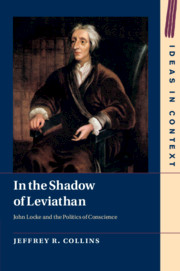Book contents
- In the Shadow of Leviathan
- Ideas in Context
- In the Shadow of Leviathan
- Copyright page
- Dedication
- Contents
- Acknowledgements
- Note on the Text
- Abbreviations
- Introduction
- Chapter 1 John Locke and Interregnum Hobbism
- Chapter 2 The Restoration Projects of Thomas Hobbes
- Chapter 3 Locke and the Restoration Politique
- Chapter 4 Non-domination Liberty in Spiritual Context
- Chapter 5 Locke, Conscience, and the Libertas Ecclesiae
- Chapter 6 Locke and Catholicism
- Chapter 7 Locke and a ‘More Liberal’ Hobbism
- Conclusion
- Bibliography
- Index
- Ideas In Context
Chapter 1 - John Locke and Interregnum Hobbism
Published online by Cambridge University Press: 07 February 2020
- In the Shadow of Leviathan
- Ideas in Context
- In the Shadow of Leviathan
- Copyright page
- Dedication
- Contents
- Acknowledgements
- Note on the Text
- Abbreviations
- Introduction
- Chapter 1 John Locke and Interregnum Hobbism
- Chapter 2 The Restoration Projects of Thomas Hobbes
- Chapter 3 Locke and the Restoration Politique
- Chapter 4 Non-domination Liberty in Spiritual Context
- Chapter 5 Locke, Conscience, and the Libertas Ecclesiae
- Chapter 6 Locke and Catholicism
- Chapter 7 Locke and a ‘More Liberal’ Hobbism
- Conclusion
- Bibliography
- Index
- Ideas In Context
Summary
Chapter 1 examines the early university career of Locke, detailing his proximity to Oxford Independents during the Interregnum and to more conformist figures after the Restoration. The chapter charts Locke’s possible exposure to Hobbes’s Leviathan and to debates over sovereignty and conscience that were strongly coloured by Hobbesian themes. Central to the chapter are Locke’s connection to figures such as John Owen and Henry Stubbe and early evidence of his political reading. These researches contextualize Locke’s early correspondence and his unpublished ‘Two Tracts’ and suggest the influence of Hobbes on both. The young Locke emerges as a figure versed in the new contractual theories of sovereignty and their implications for religious governance. The chapter also makes a case for deploying the categories of ‘civil’ and ‘prophetic’ religion in historical analysis of the period.
Keywords
- Type
- Chapter
- Information
- In the Shadow of LeviathanJohn Locke and the Politics of Conscience, pp. 15 - 62Publisher: Cambridge University PressPrint publication year: 2020

